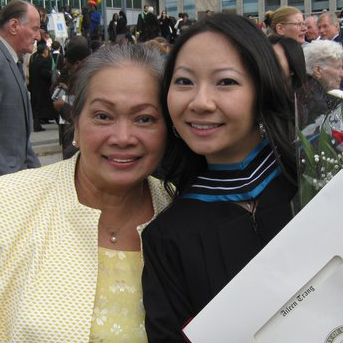My mother has had health challenges for as long as I can remember. When I was a tot, she was able to get by understanding what was happening at her medical appointments with the support of my father and by guessing what her health care team was telling her.

Aileen and her mother at Aileen's university graduation
When her health issues became more complicated about a decade ago, “guess-timating” what the doctor was saying suddenly wasn’t working out so well. She would buy medications because the doctor had prescribed them for her. Then I’d find pill bottles stuffed deep within the couch cushions, hiding in flower pots, or stashed away behind her collection of dancing porcelain figurines. She didn’t understand her medications and she didn’t want to take them. It took her getting sicker before I realized she had low health literacy.
"Health literacy" was the first term I learned when I joined the
Patient Education team at Princess Margaret. Like me, you might not know the term "health literacy" by name – it’s a fancy term for a person’s ability to use many different skills to
get, understand and act on health information. Health literacy is so important. I found out that low health literacy has been linked to:
- Less use of preventive services
- Delayed diagnoses
- Difficulty following medical instructions
- Difficulty managing side effects and overall health
- Higher health care cost
- Poorer health
What blew me away was the statistic – about
60% of Canadians are affected by low health literacy.
But there are lots of things you and your family can do to help improve your health literacy. Most simply, by asking.
- Ask your doctor to repeat information in a different way if you don’t understand something.
- Ask your health care team for more information to help you understand (like books, pamphlets and videos).
- Ask for a
translator if you prefer to communicate in a language other than English during your medical appointments. Some hospitals, like Princess Margaret, provide them free of charge.
So I started going to appointments with my mom. I request medical interpreters for her hospital appointments. I ask the doctors to repeat information using different words when my mom doesn't understand. I listen and take notes while my mom and her doctor talk. I ask questions for her when she’s too overwhelmed, feeling shy or embarrassed.
Things got better. My mom feels less anxious about her health and more in control of her care. She understands the importance of her medications and takes them. As for the doctors and nurses, they get information from us that they need to plan her care appropriately.
Learn more about health literacy and how you can improve communication between you and your health care team by reading these pamphlets below.
